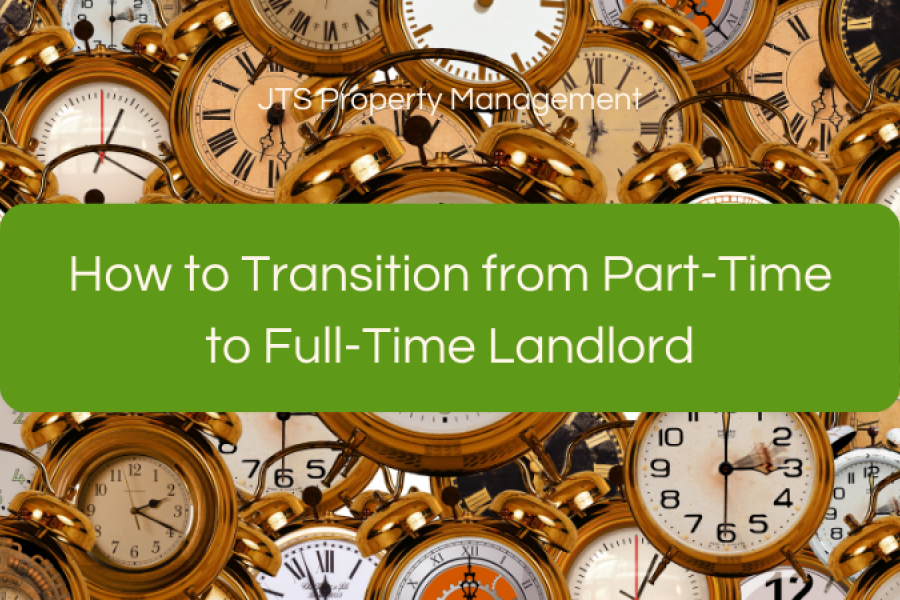Do you find yourself daydreaming about ditching the 9-to-5 and stepping into the world of a full-time landlord?
As a part-time landlord, you may have enjoyed the flexibility of managing a property or two while balancing other commitments. Moving to full-time landlord status means scaling up your efforts, from property management tasks to tenant interactions.
This transition involves more than just increasing your number of rental properties – it's a shift in your role, responsibilities, and time commitment.
Here are some great tips to become a full time landlord:
Assess Your Financial Readiness
Transitioning from part-time landlord to full-time freedom requires solid financial footing. Before taking the plunge, evaluate your financial state and ensure you're prepared for the journey.
Financial Snapshot
- Income & Expenses: Take a thorough look at your current income, including your existing salary (if applicable), rental income, and any other investments. Factor in your personal expenses, debts, and existing financial obligations.
- Cash Flow Forecast: Project your potential rental income based on your portfolio and current market rates. Include projected vacancies and anticipated maintenance costs. Estimate your operating expenses, such as insurance, property taxes, and management fees.
- Savings & Emergency Fund: Building a robust emergency fund is crucial for any landlord, especially those transitioning full-time. Aim for at least 6-12 months of living expenses to cover unexpected repairs, tenant delinquencies, or market downturns.
Debt Reduction
- High-interest debt: Prioritize paying down high-interest loans like credit cards and personal loans. Reducing such debt frees up cash flow for your rental business and improves your overall financial health.
- Mortgage analysis: Analyze your existing mortgage terms and consider refinancing if a lower interest rate can optimize your cash flow.
Financial Cushion
- Living Expenses: Assess your lifestyle and determine if your projected rental income can comfortably cover your essential living expenses (housing, food, utilities, etc.). Remember, income can fluctuate, so plan for a buffer.
- Investments & Retirement: Don't neglect long-term financial goals. Ensure your rental income complements your existing investment strategy and doesn't jeopardize your retirement plans.
Diversify Your Portfolio
Don't put all your eggs in one basket! Diversifying your portfolio across different property types, locations, and price points is an important factor. Consider these:
- Single-family homes: Offers stable income and long-term appreciation potential.
- Multi-unit properties: Generates higher rental income but require more management effort.
- Vacation rentals: These can offer high seasonal income but come with fluctuating demand.
- Commercial properties: Can provide a steady income from businesses but require specialized knowledge.
Create Efficient Systems
As you transition from part-time landlord to full-time pro, streamlining your operations becomes crucial for success. Efficient systems free up your time, reduce stress, and ensure your business runs smoothly. Here are some key areas to focus on:
- Standardize your application process. Use online forms and screening platforms to collect information and run credit checks efficiently.
- Create clear lease agreements. Outline tenant responsibilities, rent payment procedures, and maintenance protocols in your agreements.
- Develop a smooth onboarding process. Welcome new tenants, introduce them to the property, and provide essential information like contact details and emergency procedures.
- Offer convenient payment options. Online portals, automatic transfers, and mobile payments can increase on-time payments.
- Send reminders. Automate rent reminders and late fee calculations.
- Use accounting software. Use software to track income and expenses and generate financial reports.

Establish a Contingency Plan
As a full-time landlord, unexpected challenges and setbacks are inevitable. A solid contingency plan will be your roadmap for weathering these storms and minimizing their impact on your business and peace of mind. Here are three key elements to consider.
Anticipating Potential Challenges and Setbacks
- Market fluctuations: Be prepared for potential changes in rental rates, vacancy rates, or economic downturns.
- Tenant issues: Anticipate possible challenges like rent delinquency, property damage, or tenant disputes.
- Maintenance emergencies: Major repairs, maintenance. or unexpected system failures can be costly and disruptive.
- Natural disasters: Depending on your location, consider the potential impact of storms, floods, or other natural events.
Developing Strategies to Handle Unexpected Expenses:
- Maintain a healthy emergency fund: Aim for at least six months of living expenses and operating costs to cover unplanned events.
- Explore insurance options: Ensure you have adequate property insurance, liability insurance, and loss of rent coverage.
- Diversify your income streams: Consider investing in other assets to create backup income sources.
- Negotiate flexible payment terms with vendors: Establish relationships with reliable contractors who offer payment plans for major repairs.
Building a Network of Reliable Contractors and Service Providers
- Find help: Research and pre-qualify contractors for various services like plumbers, electricians, roofers, etc. Negotiate preferred rates and service agreements.
- Communicate: Establish clear communication channels and response protocols for emergencies.
Seek Professional Guidance
Seeking guidance from a reputable property management company is essential for a smooth transition to a full-time landlord.

Look for a company with local market expertise, a strong focus on legal compliance, and effective tenant screening and placement processes. Ensure transparent communication, technology integration for efficient management, and a proactive approach to maintenance.
Consider flexible service packages tailored to your needs and check references and reviews for client satisfaction. A local presence and a commitment to fostering positive tenant relationships are additional factors to prioritize. Professional guidance from a property management company can significantly enhance your property portfolio's success and long-term growth.
Bottom Line
Transitioning from a part-time to a full-time landlord is a significant undertaking that requires careful planning and strategic decision-making. Assessing your financial readiness, expanding your portfolio, and seeking professional guidance are key steps for a successful shift.
Consider the comprehensive property management services offered by JTS Property Management. With their expertise, you can navigate the challenges seamlessly and position yourself for long-term success.
Contact JTS Property Management today to ensure a smooth and rewarding transition into being a full-time landlord.


